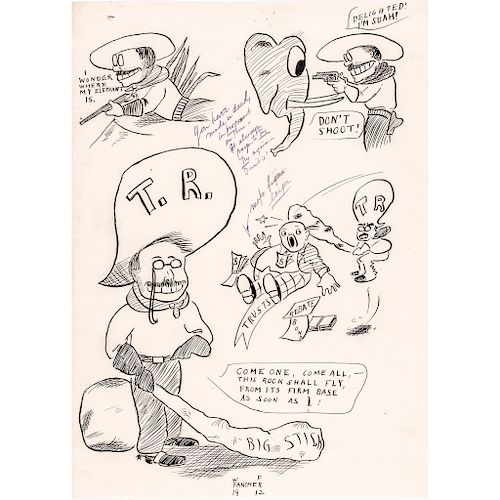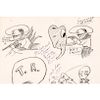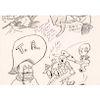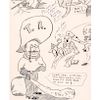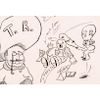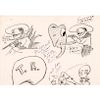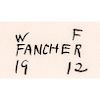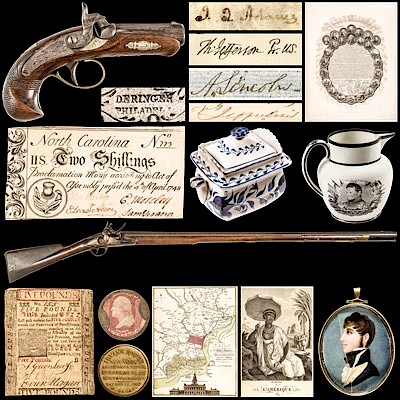1912 Theodore Roosevelt Presidential Campaign Hand Drawn Political Cartoon Art
Lot 294
Categories
Estimate:
$800 - $1,000
Absentee vs Live bid
Two ways to bid:
- Leave a max absentee bid and the platform will bid on your behalf up to your maximum bid during the live auction.
- Bid live during the auction and your bids will be submitted real-time to the auctioneer.
Bid Increments
| Price | Bid Increment |
|---|---|
| $0 | $10 |
| $200 | $20 |
| $300 | $25 |
| $500 | $50 |
| $1,000 | $100 |
| $2,000 | $200 |
| $3,000 | $250 |
| $5,000 | $500 |
| $10,000 | $1,000 |
| $20,000 | $2,000 |
| $30,000 | $2,500 |
| $50,000 | $5,000 |
| $100,000 | $10,000 |
| $200,000 | $20,000 |
| $300,000 | $25,000 |
| $500,000 | $50,000 |
About Auction
By Early American History Auctions
Oct 19, 2019
Set Reminder
2019-10-19 12:00:00
2019-10-19 12:00:00
America/New_York
Bidsquare
Bidsquare : Historic Autographs-Currency-Political-Americana-Militaria-Guns
https://www.bidsquare.com/auctions/early-american-history-auctions/historic-autographs-currency-political-americana-militaria-guns-4513
326 Lots of Rare, Historic Autographs, Americana, Civil War Era, George Washington, Abraham Lincoln, Black History, Revolutionary War Era, Colonial America, Federal Period, War of 1812, Colonial Currency, Indian Peace Medals & more... Early American History Auctions auctions@earlyamerican.com
326 Lots of Rare, Historic Autographs, Americana, Civil War Era, George Washington, Abraham Lincoln, Black History, Revolutionary War Era, Colonial America, Federal Period, War of 1812, Colonial Currency, Indian Peace Medals & more... Early American History Auctions auctions@earlyamerican.com
- Lot Description
Political
1912 Theodore Roosevelt Presidential Campaign Political Cartoon with Hand-Drawn "Carry A Big Stick" Caricatures
1912-Dated, Theodore Roosevelt Presidential Election Campaign, Original Political Poster Artwork, Hand-Drawn Cartoon with "Carry A Big Stick" theme Caricatures of Theodore Roosevelt, by W.F. Fancher, Choice Extremely Fine.
Outstanding fully Drawn Original Artwork Poster with Hand-Drawn political caricatures, 1 page, measuring 16" x 11.5" on heavy white wove Art paper, no folds. This original Poster was created by a student, W.F. Fancher and then critiqued by the teacher, (who is unnamed). The teacher writes, "You have made a dandy improvement on these - It always pays to try try again doesn't it?" The teacher notes on one drawing to, "make figure larger." This Poster sheet has 4 separate drawings:
1. At upper left showing Theodore Roosevelt laying down with his rifle and the text: "I wonder where my elephant is."
2. Upper right shows Roosevelt facing an elephant with his pistols drawn, elephant says: "DON'T SHOOT".
3. At middle it shows Roosevelt hitting a portly figure labeled "TRUSTS" over the head, with his "Big Stick".
4. The largest drawing has Roosevelt standing with his "Big Stick" saying: "COME ONE, COME ALL, - THIS ROCK SHALL FLY FROM ITS FIRM BASE AS SOON AS I !"
The United States Presidential election of 1912 was the 32nd quadrennial Presidential election, held on Tuesday, November 5, 1912. The election was a rare four-way contest.
Incumbent President William Howard Taft was renominated by the Republican Party with the support of its conservative wing. After former President Theodore Roosevelt failed to receive the Republican nomination, he called his own convention and created the Progressive Party (nicknamed the "Bull Moose Party"). It nominated Roosevelt and ran candidates for other offices in major states.
Democrat Woodrow Wilson was finally nominated on the 46th ballot of a contentious convention, thanks to the support of William Jennings Bryan, the three-time Democratic presidential candidate who still had a large and loyal following in 1912. Eugene V. Debs, running for a fourth time, was the nominee of the Socialist Party of America.
Wilson won the election, gaining a large majority in the Electoral College and winning 42% of the popular vote, while Roosevelt won 27%, Taft 23% and Debs 6%. Wilson became the only elected president from the Democratic Party between 1892 and 1932, and the second of only two Democrats to be elected president between 1860 and 1932.
This was the last election in which a candidate who was not a Republican or Democrat came second in either the popular vote or the Electoral College, and the first election in which all 48 states of the contiguous United States participated.
- Shipping Info
-
Early American provides in-house worldwide shipping. Please contact us directly if you have questions about your specific shipping requirements.
-
- Buyer's Premium



 EUR
EUR CAD
CAD AUD
AUD GBP
GBP MXN
MXN HKD
HKD CNY
CNY MYR
MYR SEK
SEK SGD
SGD CHF
CHF THB
THB